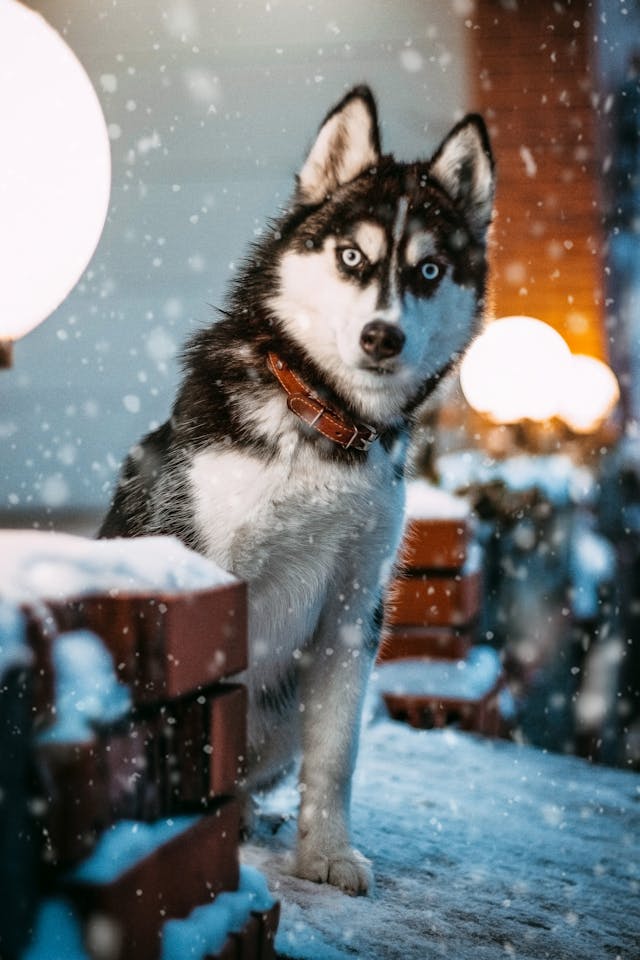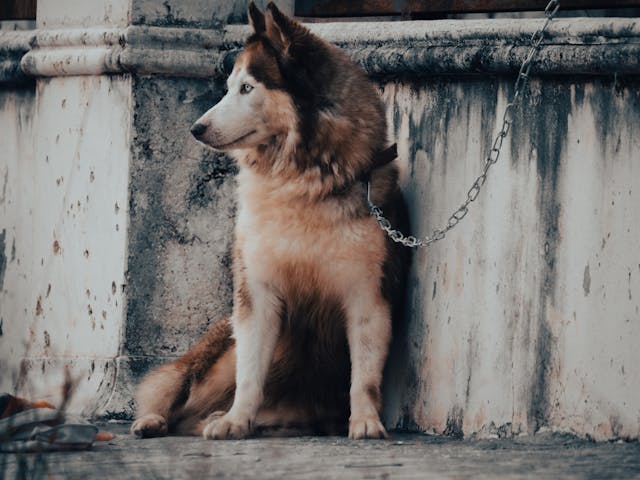As a Husky owner, there’s a lot to love about these majestic dogs. Their striking appearance, boundless energy, and playful nature make them excellent companions. But when your Husky turns 8 years old, you might find yourself asking: “How old is a Husky in human years?” or even, “Is 8 years a good life for a dog?” It’s hard to ignore the thought that your once-energetic puppy is now becoming a senior, and that can bring up a lot of questions.
So, let’s take a deep dive into the topic and explore what 8 years in Husky years really means. We’ll talk about health, behavior, and everything in between, to help you understand what to expect as your Husky enters their senior years.
Table of Contents
Busting the “Dog Years” Myth
First off, let’s talk about the ever-popular myth that one dog year equals seven human years. While it’s a fun and easy rule of thumb, it’s not really accurate—especially when it comes to different breeds. Huskies age differently than smaller or larger breeds, and they tend to be a bit unique in how they grow older. So, if you’ve been using the “7 dog years = 1 human year” formula, it’s time for a little math refresh.
For Huskies, their first year of life equals around 15 human years—talk about a growth spurt! In their second year, they rack up another 9 human years, bringing a 2-year-old Husky to about 24 human years. After that, each dog year typically equals about 5 human years. So, when your Husky turns 8, they’re roughly 56 human years old. They’re still full of life, but just like us, they start to settle into a more mature routine.

How old is my 8-year-old dog in dog years?
Simply put, your 8-year-old Husky is around 56 years old in human terms. That’s equivalent to a person in their mid-to-late 50s—still in their prime but definitely starting to slow down in some areas.
So, Is 8 Years Old “Old” for a Husky?
When people ask, “Is 8 years a good life for a dog?”, it’s important to keep in mind that 8 years old is considered senior status for most dogs, especially large breeds like Huskies. But just because they’ve hit the 8-year mark doesn’t mean they’re nearing the end of their life. In fact, many Huskies can live well into their teens—up to 12 to 15 years with proper care. So, while they may be considered “older,” they still have plenty of energy and joy left in them!
If you’re wondering, “How old is a Husky in human years?”, your 8-year-old Husky is about the same age as a 56-year-old human. They’re definitely in the later stages of middle age, so it’s a great time to start paying attention to their health and comfort, as their needs may change.
What to Expect From Your 8-Year-Old Husky
At 8 years old, your Husky is entering a new phase in life. They might not be as energetic as they were as a pup, but they’re still your loyal, fun-loving companion. Here’s what to expect:
1. Health Changes:
With age comes the possibility of health issues, and Huskies are no different. Joint problems, such as arthritis, become more common as dogs get older. You may notice your Husky slowing down, perhaps not jumping as easily onto the couch or struggling to keep up on walks. That’s a sign that it’s time to make some adjustments. Regular vet check-ups are key, especially since Huskies are prone to conditions like hip dysplasia and eye issues like cataracts or glaucoma. Keeping an eye on their health and visiting the vet for regular check-ups can help catch potential issues early.
2. Diet Adjustments:
Just like us, Huskies’ nutritional needs change as they age. At 8, your Husky might not need the same high-calorie food they required when they were younger and more active. Consider switching to a senior dog food formula, which tends to have fewer calories to prevent weight gain. These formulas also often include glucosamine and chondroitin to support their joints. Healthy, balanced meals will ensure your Husky stays in top shape and doesn’t develop obesity or other weight-related problems.

3. Exercise:
Your 8-year-old Husky may not be able to run marathons anymore, but they still need regular exercise to stay happy and healthy. Exercise is critical for mental stimulation as much as physical health. While they might prefer more leisurely walks than their younger, hyperactive selves, they still need daily activity. You can try shorter walks or play sessions in the backyard. Mental enrichment is just as important—puzzle toys, training sessions, and even a game of fetch are great ways to keep their minds sharp and engaged. Mental stimulation is often the secret to keeping senior dogs feeling younger!
4. Behavioral Shifts:
As Huskies enter their senior years, some behavioral changes are to be expected. Older dogs tend to become more independent, and they may not be as tolerant of the same things they were when they were younger. Your Husky might start napping more, or they may prefer their space and enjoy a little more time lounging around. On the flip side, they might also become more clingy or vocal when they want attention—so don’t be surprised if they’re always seeking your company. They’re likely experiencing changes in their comfort and energy levels, and they’ll look to you for reassurance.
5. Grooming Needs:
If you’ve had a Husky for a while, you know that grooming is a big part of their life. Huskies are known for their thick, double-layered coats, which shed year-round. But as they age, they might not groom themselves as effectively as they once did. Regular brushing can help keep their fur healthy, but it also serves another purpose: it gives you the chance to check for any skin issues, lumps, or injuries that could have gone unnoticed. Plus, it’s a bonding time! Huskies love attention from their owners, and grooming is a great way to show affection while keeping them comfortable.
Tips for Caring for Your Senior Husky
To keep your 8-year-old Husky happy, healthy, and comfortable as they enter their golden years, here are some things you can do:
- Regular Vet Visits: Your senior Husky will need more frequent vet visits to monitor their health. These check-ups will help identify any age-related health issues, like arthritis, heart disease, or vision problems. Catching these things early can make all the difference in your dog’s quality of life. Don’t hesitate to ask your vet about any concerns, from diet changes to mobility issues.
- Consider a Senior Diet: Specialized senior dog foods offer exactly what your aging Husky needs, from easier-to-digest ingredients to extra nutrients that promote joint health. Consult your vet about the best food options and any potential supplements your dog might benefit from.
- Exercise in Moderation: While they might not be able to keep up with the same workout routine from their younger days, your Husky still needs regular exercise. Adapt their daily walk to their comfort level—shorter, slower walks with some playtime thrown in will do wonders for their body and mind.
- Create a Comfortable Space: Your aging Husky might find it harder to get up and down, especially on hard floors or high furniture. Consider orthopedic beds to support their joints and ramps to help them get in and out of cars or onto beds. A cozy, comfortable space will make their senior years a lot easier on their body.
- Stay Engaged: Even though your Husky is now in their senior years, they still need to feel loved, valued, and mentally challenged. Incorporate puzzle games, scent work, and obedience training into their routine to keep them sharp and engaged. Mental stimulation is just as important as physical activity, and it will help your Husky feel young at heart.

Final Thoughts
Your 8-year-old Husky may be in the senior phase of their life, but that doesn’t mean they’re any less important or lovable than when they were puppies. With a few adjustments to their diet, exercise, and overall care, your Husky can continue to live a long, healthy, and happy life.
So, to answer the burning question: Is 8 years a good life for a dog? Absolutely. While it’s a milestone that marks the beginning of their senior years, many Huskies go on to live a long, vibrant life well beyond 8 years. Your Husky will still be that energetic, loyal companion you’ve always known—just with a little more wisdom, and perhaps a few more naps along the way.
Enjoy the golden years with your furry friend. 8 years in Husky dog years is just another chapter in the wonderful story of your bond, and there’s so much more joy to come. Cherish every walk, every cuddle, and even those moments when they remind you that Huskies love to “talk back.” These years are an opportunity to deepen your connection and appreciate the incredible loyalty and companionship they bring to your life.
With a little extra care, your Husky will continue to thrive, proving that age is just a number when love and attention are at the center of their world. After all, whether they’re 8 years or 15 years old, they’ll always be your playful, mischievous, and deeply loved best friend.
My Journey with Luna: Life Lessons from a Husky
How Much Should Corgis Eat a Day? Age, Diet, & Myths Explained
How Big Do Siberian Huskies Get?Answers You Need!
The Untold Truth of Living with a Chihuahua

